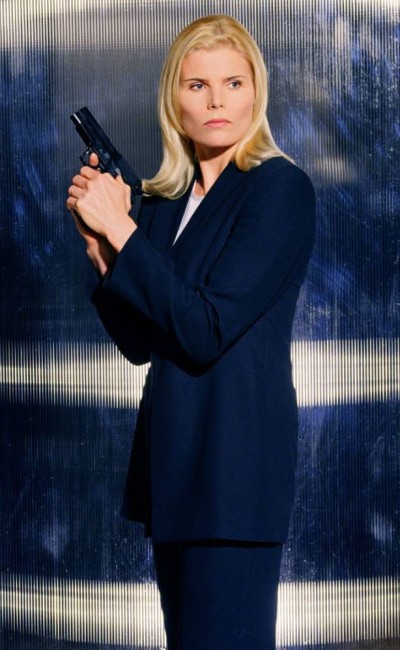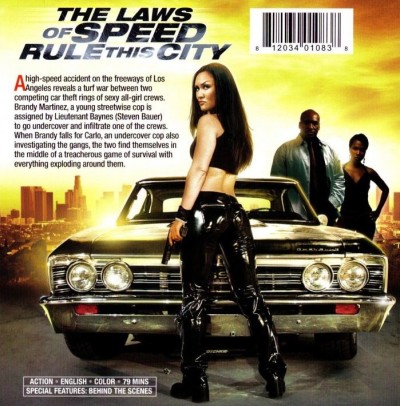★★★½
“If you thought Showgirls really needed more kung-fu…”
 Make no mistake. By few objective standards could this be described as a “good” film. It is, however, one I found entertaining as all get-out, in a “WTF were they thinking?” kinda way. The main story has Hawaiian cop Jo Alwood (Ford) hunting sleazebag psycho mercenary Robert Kell (Broome), He killed Jo’s sister, among a slew of other women, just after she had accepted a position as bodyguard to bisexual S/M pop star Delilah (Mark), who is his final target. If this sounds a bit familiar, it’s a remake of 1992’s Blackbelt, by the same director, which starred Don ‘The Dragon’ Wilson as the cop. Ford isn’t as good as martial arts, but makes up for this shortcoming by the frequency with which she takes her top off. Heck, she even combines the two, and does martial arts clad only in a thong, which reminded me of another Roger Corman Philippino production, Angel Fist, from the previous year. Rumour has it, the original star, Charlie Spradling, refused to do the scene, so was relegated to the role of the murdered sister.
Make no mistake. By few objective standards could this be described as a “good” film. It is, however, one I found entertaining as all get-out, in a “WTF were they thinking?” kinda way. The main story has Hawaiian cop Jo Alwood (Ford) hunting sleazebag psycho mercenary Robert Kell (Broome), He killed Jo’s sister, among a slew of other women, just after she had accepted a position as bodyguard to bisexual S/M pop star Delilah (Mark), who is his final target. If this sounds a bit familiar, it’s a remake of 1992’s Blackbelt, by the same director, which starred Don ‘The Dragon’ Wilson as the cop. Ford isn’t as good as martial arts, but makes up for this shortcoming by the frequency with which she takes her top off. Heck, she even combines the two, and does martial arts clad only in a thong, which reminded me of another Roger Corman Philippino production, Angel Fist, from the previous year. Rumour has it, the original star, Charlie Spradling, refused to do the scene, so was relegated to the role of the murdered sister.
If that weren’t enough, Kell kidnaps Delilah’s sidekick/lover, and as ransom, demands that Detective Ford take a starring part in Delilah’s show. Even more bizarrely, she agrees, though I doubt any red-blooded male [and, let’s face it, that’s 95% of your target audience] is going to care about logic, considering the pay-off. That’s an area in which it feels a lot like an Andy Sidaris flick, though he actually shot in Hawaii, rather than as here, trying to fake it with the less salubrious areas of Manilla. He also left the hand-to-hand stuff up to his male leads, but Ford (and her stunt double) does credibly enough there, and is made to look semi-competent. Oh, I almost forgot the largely irrelevant subplot where Delilah’s manager is trying to kill her for the insurance money. Though since this does lead to the thong-based martial arts mentioned above, I’m not complaining too much.
It’s perhaps telling that the male leads – not just Broome, but Bacci as Alwood’s partner – never seems to have appeared in anything else, before or since, and it seems fairly clear that instruction came down from Corman Towers to make this all about the ladies. I’ve seen much less fun films, that didn’t need to be rewritten half-way through: Ford deserves enormous credit for plunging into this with an appropriate level of devil-may-care, and going where Charlie Spradling feared to tread.
Dir: Charles Philip Moore
Star: Maria Ford, Jessica Mark, Jimmy Broome, Antonio Bacci
Sorry: not available in the US. Well done, New Horizon, for helping suppress something promoting your own movie!





 Not unlike
Not unlike  Patty (Eleniak) is in an abusive relationship, but finds an outlet through an unconventional source – boxing. This comes through her friend June (Ellis), who works occasionally as a ring-girl for a promoter (Doman). One of his fighters is Tommy (Colby), a part-time boxer whose main source of income is as a limo driver, but also helps run a gym in the upstate New York city of Troy, which helps keep the local kids out of trouble. Reluctantly, he agrees to train Patty, who develops, not only physical strength as a result, but the self-confidence to handle her situation.
Patty (Eleniak) is in an abusive relationship, but finds an outlet through an unconventional source – boxing. This comes through her friend June (Ellis), who works occasionally as a ring-girl for a promoter (Doman). One of his fighters is Tommy (Colby), a part-time boxer whose main source of income is as a limo driver, but also helps run a gym in the upstate New York city of Troy, which helps keep the local kids out of trouble. Reluctantly, he agrees to train Patty, who develops, not only physical strength as a result, but the self-confidence to handle her situation. The low score for this is partly not entirely the film’s fault. Despite the title, it’s actually the third entry in a series of TV movies – following First Daughter and First Target. All focus on blonde Secret Service agent Alex McGregor, charged with protecting the President and his family. However, only this one is available on Netflix, which is where I picked it up: had I known in advance, I would likely have started at the beginning. Certainly, the abundance of references to events prior to the start of this movie becomes explicable – if no less irritating – and this might well make more sense if you’ve seen, in particular, First Daughter. The makers seem largely to ignore the second entry, First Target – perhaps because the role of McGregor there was played by Daryl Hannah, after Mariel Hemingway turned down the role she had played in #1. She returned here,
The low score for this is partly not entirely the film’s fault. Despite the title, it’s actually the third entry in a series of TV movies – following First Daughter and First Target. All focus on blonde Secret Service agent Alex McGregor, charged with protecting the President and his family. However, only this one is available on Netflix, which is where I picked it up: had I known in advance, I would likely have started at the beginning. Certainly, the abundance of references to events prior to the start of this movie becomes explicable – if no less irritating – and this might well make more sense if you’ve seen, in particular, First Daughter. The makers seem largely to ignore the second entry, First Target – perhaps because the role of McGregor there was played by Daryl Hannah, after Mariel Hemingway turned down the role she had played in #1. She returned here,  Purely coincidental that I viewed this not long after
Purely coincidental that I viewed this not long after  After the magnificence of Donnie Yen and Khan in its insane predecessor, the fifth installment was always going to have a tough job living up to the same standard. On its own terms, it’s perfectly reasonable, but certainly suffers in the comparison, not least because the storyline is strikingly similar. Once again, there’s an innocent who gets caught up in murky dealings between Inspector Yang Lei-Ching (Khan) and the CIA, and finds themselves on the run from a pack of assassins, unsure who to trust – except Yang, of course. In this case, it’s her cousin, David (Wu), a marine who has returned to Hong Kong, only to find himself under suspicion for espionage. In particular, being part of a Korean group, led by a man known only as ‘The General’ (Chow), who deals in Western secrets. It’s up to David and Lei-Ching to prove otherwise – if they can stay alive long enough to do it.
After the magnificence of Donnie Yen and Khan in its insane predecessor, the fifth installment was always going to have a tough job living up to the same standard. On its own terms, it’s perfectly reasonable, but certainly suffers in the comparison, not least because the storyline is strikingly similar. Once again, there’s an innocent who gets caught up in murky dealings between Inspector Yang Lei-Ching (Khan) and the CIA, and finds themselves on the run from a pack of assassins, unsure who to trust – except Yang, of course. In this case, it’s her cousin, David (Wu), a marine who has returned to Hong Kong, only to find himself under suspicion for espionage. In particular, being part of a Korean group, led by a man known only as ‘The General’ (Chow), who deals in Western secrets. It’s up to David and Lei-Ching to prove otherwise – if they can stay alive long enough to do it. This is the third version of the same concept I’ve seen, following some years after the
This is the third version of the same concept I’ve seen, following some years after the  The back-story behind how this was made is, in some ways, more interesting than the film itself. The star and co-writer was working as a stripper, and came up with the idea, almost as a coping mechanism to handle some of the creeps with whom she had to interact. Funding came from a customer at one of the clubs. But, unfortunately, it turned out that the money he was “investing” was actually being embezzled, leading to a two-year crawl through post-production – it still hasn’t received an official release in its American home. Made in 1997, it looks like a fossil from an earlier, much scuzzier era, with both its grimy New York locations and feel harking back to the work of Abel Ferrara.
The back-story behind how this was made is, in some ways, more interesting than the film itself. The star and co-writer was working as a stripper, and came up with the idea, almost as a coping mechanism to handle some of the creeps with whom she had to interact. Funding came from a customer at one of the clubs. But, unfortunately, it turned out that the money he was “investing” was actually being embezzled, leading to a two-year crawl through post-production – it still hasn’t received an official release in its American home. Made in 1997, it looks like a fossil from an earlier, much scuzzier era, with both its grimy New York locations and feel harking back to the work of Abel Ferrara. After a freeway chase ends in a fatal crash, a policewoman (Lizette) goes undercover to infiltrate the warring gangs of car thieves responsible. As “Baby” Martinez, she helps Eve (Lethridge) evade capture by an irate car-owner and, as a result, is recruited to join the all-female group of which Eve is a part, operating under the protection of Mama (Olivia Brown). However, Eve has a past to contend with, having defected from the gang led by Knight (Parker) – and worse still, taken his classic car with her. Unknown to her, the trunk holds a stash of drugs, whose loss leaves Knight feeling the heat from those in the criminal food chain above him. As a result, he’s prepared to go to any lengths to recover his property.
After a freeway chase ends in a fatal crash, a policewoman (Lizette) goes undercover to infiltrate the warring gangs of car thieves responsible. As “Baby” Martinez, she helps Eve (Lethridge) evade capture by an irate car-owner and, as a result, is recruited to join the all-female group of which Eve is a part, operating under the protection of Mama (Olivia Brown). However, Eve has a past to contend with, having defected from the gang led by Knight (Parker) – and worse still, taken his classic car with her. Unknown to her, the trunk holds a stash of drugs, whose loss leaves Knight feeling the heat from those in the criminal food chain above him. As a result, he’s prepared to go to any lengths to recover his property.